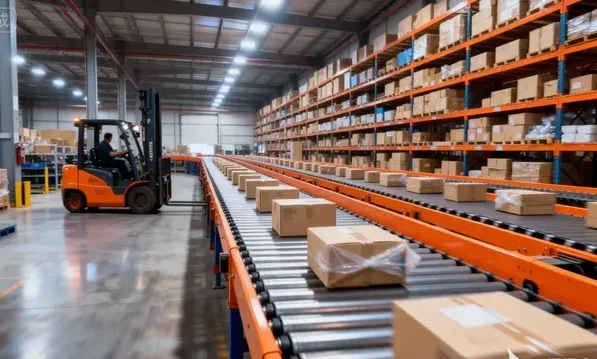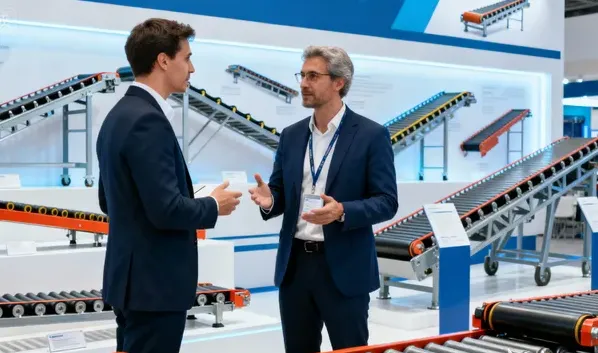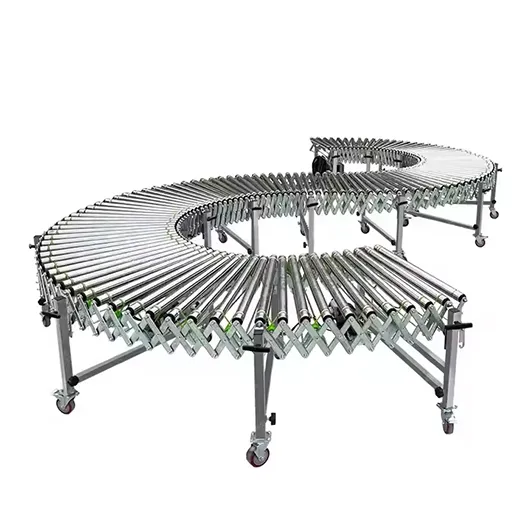Conveyor System Manufacturer – How to Choose the Right Partner for Your Facility
Is your factory floor struggling to keep up? Do you see bottlenecks, high labor costs, and packaging errors that hurt your profits? You are not alone. Many manufacturing plants find their growth is stopped by old, slow, or unreliable material handling. This problem costs you money every single day. It slows down production. It makes your business less able to compete.
This guide will help you. We will show you how to find the right conveyor system manufacturer. A good partner can change your business. They can give you the tools to grow, become more efficient, and lead your market. We will look at what these manufacturers do, the types of systems they offer, and how to pick the best one for your factory. This is a scientific look at making a smart choice.
What a Conveyor System Manufacturer Actually Does
A conveyor system manufacturer is a company that makes equipment to move items from one place to another. But their work is much more than just building machines.
- From component supplier to turnkey systems integrator
Some manufacturers only make parts, like motors or belts. Others are a conveyor integration company. They offer turnkey conveyor system provider services. This means they do everything. They design the system, build it, install it, and make sure it works with your other machines. This is a complete conveyor design and manufacturing company. A company that offers custom engineered conveyor solutions can solve your unique problems. For example, a skilled OEM conveyor system manufacturer like Stars Creativity can design and build a full packaging line. They have the engineering skill to create a system just for you.
Typical industries served
Conveyor systems are everywhere. You will find them in many industries. A factory conveyor system supplier works with:
- Warehousing and distribution centers: especially for ecommerce fulfillment conveyor systems.
- Manufacturing: for an assembly line conveyor manufacturer.
- Food and beverage: requiring a food grade conveyor system manufacturer or a sanitary conveyor system manufacturer.
- Pharmaceutical: needing a pharmaceutical conveyor system manufacturer.
- Mining: with a mining conveyor system manufacturer.
- Airports: for an airport baggage conveyor system manufacturer.
- When you need a custom system vs. standard off-the-shelf conveyors
Sometimes, a simple, standard conveyor is enough. But often, a factory has special needs. Maybe your product is an odd shape. Maybe your space is limited. This is when you need a custom conveyor system manufacturer. They can build a system that fits your factory perfectly. A company with deep experience in customization capabilities and a modular design approach can adapt to your exact needs, providing a more effective long-term solution than a standard product.

What a Conveyor System Manufacturer Actually Does
Common Conveyor Systems You Can Source From Manufacturers
There are many types of conveyors. Each one is for a different job. A good industrial conveyor system manufacturer will offer many options.
- Belt, roller, motorized roller and pallet conveyors
- Belt Conveyor: A belt conveyor manufacturer makes systems with a simple, flat belt. These are very common. They are used for moving boxes, bags, and parts. You can find a simple PVC Belt Conveyor in many factories.
- Roller Conveyor: A roller conveyor manufacturer uses rollers to move items. Some use gravity (gravity roller conveyor manufacturer). Others have motors (powered roller conveyor manufacturer).
- Pallet Conveyor: A pallet conveyor system manufacturer builds strong systems to move heavy pallets. This often involves a pallet handling conveyor manufacturer using heavy-duty chains or rollers.
- Chain, slat, and overhead conveyors
- Chain Conveyor: A chain conveyor manufacturer uses chains to pull products along the line. These are very strong and reliable.
- Slat Conveyor: These are similar to chain conveyors but have flat slats on top.
- Overhead Conveyor: An overhead conveyor system manufacturer hangs the conveyor from the ceiling. This saves floor space.
- Sortation, accumulation, spiral and vertical conveyors
- Sortation Conveyor: A sorting conveyor system manufacturer builds systems that automatically send different items to different places.
- Accumulation Conveyor: An accumulation conveyor system manufacturer designs lines that can hold items in a buffer before moving them to the next step.
- Spiral Conveyor: A spiral conveyor system manufacturer makes conveyors that go up or down in a spiral shape, saving space.
- Bulk handling systems
For moving loose materials like grain or sand, you need a bulk material handling conveyor manufacturer. This includes systems like a screw conveyor system manufacturer or a bucket elevator conveyor manufacturer.
- Specialty lines
Some industries have very specific needs. A stainless steel conveyor manufacturer serves the food industry. A cleanroom conveyor system manufacturer is for electronics or pharma. A beverage conveyor system manufacturer handles bottles and cans.
Identify Your Project Requirements Before Contacting Manufacturers
Before you talk to a conveyor system engineering company, you must do your homework. Know what you need.
- Product characteristics What are you moving? You need to know its size, weight, shape, and fragility. Is it hot or cold? Wet or dry? This is the first step.
- Throughput targets How fast do you need to move things? This is your throughput. You need to know your peak volume (the busiest time) and your average volume. This helps the high speed conveyor system manufacturer design the right system.
- Layout constraints Look at your factory. What is the ceiling height? Are there columns in the way? Where are the loading docks? A good factory automation conveyor solutions provider will need a map of your space.
- Environment Where will the conveyor be? Is it a cleanroom, freezer, or washdown area? Is it dusty or outdoors? A paint line conveyor system manufacturer has different needs than a dairy conveyor system manufacturer.
- HHI: Integration scope Does the conveyor need to talk to other systems? This includes your Warehouse Management System (WMS), robots, or an Automated storage and retrieval system (ASRS). This requires a partner with strong conveyor controls and automation skills.
Key Criteria for Choosing a Conveyor System Manufacturer
Choosing a partner is a big decision. You are not just buying a machine. You are buying a solution that will affect your business for years. Here are the key things to look for.
- Engineering depth and application experience Has the manufacturer worked in your industry before? Do they understand your challenges? A global conveyor system manufacturer with experience in 80+ countries, like Stars Creativity, has likely seen and solved problems similar to yours.
- Ability to deliver turnkey projects Can the company handle everything from design, controls, fabrication, installation, to commissioning? A full-service provider saves you headaches.
- Customization capabilities and modular design approach Your needs will change. Can the system grow and adapt with you? A modular belt conveyor manufacturer that offers flexible and modular plastic belt conveyor manufacturer solutions gives you options for the future.
- Compliance with safety and hygiene standards This is critical. The equipment must meet standards like OSHA, CE, FDA, and ISO. For food, a sanitary conveyor system manufacturer is a must. CE certification, for example, shows that a machine meets EU safety standards, a key quality mark for a conveyor system supplier China.
- Component quality, reliability, and energy efficiency Look at the small parts: the motors, drives, belts, and sensors. Are they from good brands like Siemens Logistics or Interroll Group? High-quality parts lead to low maintenance conveyor systems and energy efficient conveyor systems.
- After-sales service, local support, and spare parts strategy What happens after the sale? Does the company offer good support and have spare parts ready?
- Financial stability, references, and installed base Is the company strong? Can you talk to their other customers? A long history, like being founded in 2005, shows stability.

Key Criteria for Choosing a Conveyor System Manufacturer
Global vs. Local Conveyor System Manufacturers
Should you buy from a local company or a global conveyor system manufacturer?
- Lead times, shipping, and installation costs A local supplier might be faster. But a global conveyor system manufacturer OEM ODM partner might offer better value.
- Time zone, language, and support Can you communicate easily? A global company with strong export experience will have this figured out.
- Export experience and certifications If you buy from overseas, they must understand export rules and have the right certifications, like CE.
- Balancing cost, TCO, and service The upfront price is not the whole story. You must look at the Total Cost of Ownership (TCO). This includes energy, maintenance, and downtime. A reliable, efficient system from a trusted industrial conveyor equipment manufacturer can have a lower TCO even if the first cost is higher.
Step-by-Step Process to Work With a Conveyor System Manufacturer
- Initial Discovery: The manufacturer studies your site and goals.
- Concept Design: They create layout options and rough budgets.
- Detailed Engineering: They design the mechanical and electrical parts. This includes PLC controlled conveyor systems.
- Proposal and ROI: They show you the cost and the Return on Investment (ROI).
- Factory Acceptance Test (FAT): You test the system at their factory before it ships.
- Installation and Training: They install the system and train your team.
- Support and Maintenance: They provide ongoing help and preventive maintenance plans.
Technical Checklist for Specifying Your Conveyor System
- Conveyor type: Choose the right type for the job (transport, accumulation, sortation).
- Speeds and logic: Define how fast it runs and how it handles backups.
- Safety devices: Ensure it has E-stops, guards, and interlocks.
- Noise and ergonomics: Make sure it is quiet and easy for workers to use.
- Cleanability: For food or pharma, it must be easy to clean.
- Energy use: Ask about energy efficient conveyor systems.
Cost and ROI When Selecting a Conveyor System Manufacturer
A new conveyor system is a big investment. It is hard to know if it is worth the money. You worry that the cost is too high and the payback will be too slow.
If you choose the wrong system based only on the lowest price, you could face endless problems. The system breaks down. It does not meet your speed targets. Maintenance costs add up. Soon, the cheap system becomes a very expensive mistake, costing you lost production and constant stress.
You must look at the Total Cost of Ownership and the Return on Investment. A good manufacturer will help you with this.
- Breaking down costs The total cost includes the equipment, controls software, installation, and training.
- Total Cost of Ownership (TCO) This includes future costs: energy, maintenance, downtime, and spare parts. A reliable system has a lower TCO.
- Productivity gains How will the system make you money? It will increase throughput, reduce labor costs, and improve accuracy. The global market data shows why companies are investing.
| Source / Segment |
Base Year & Value |
Forecast Year & Value |
CAGR |
| MarketsandMarkets |
2024: USD 10.4 B |
2030: USD 14.8 B |
6.0% |
| NextMSC |
2023: USD 9.03 B |
2030: USD 12.48 B |
4.74% |
| Allied Market Research |
2020: USD 9.1 B |
2030: USD 15.2 B |
5.1% |
This growth is driven by companies seeking these exact productivity gains.
Real-World Applications and Case-Style Examples
Looking at real cases shows the power of a good material handling conveyor system manufacturer.
| Case / Source |
Application |
Quantified Result |
| Herr Foods |
Snack food case handling |
25% throughput increase |
| Simmons Pet Foods |
Palletization & shipping |
Reduced to 3 handlers per line per shift |
| AutoStore project |
Automotive parts warehouse |
500% productivity increase |
These numbers prove that the right automated material handling systems manufacturer delivers real results. For example, in a food plant, a well-designed roller conveyor system can dramatically improve hygiene and speed.

Powered Flexible Roller Conveyor
Questions to Ask Any Conveyor System Manufacturer
- What similar projects have you completed?
- How do you handle future layout changes? Can your powered flexible roller conveyor adapt?
- Who is responsible for controls and integration?
- What is your standard warranty and service time?
- Which standards (CE, ISO) do your systems comply with?
- How do you calculate energy use and lifetime costs?
How to Find and Shortlist Conveyor System Manufacturers
- Use industry directories and go to trade shows.
- Evaluate their websites and case studies. A manufacturer specializing in warehouse automation conveyor systems should show examples.
- Request proposals (RFPs) to compare vendors like Hytrol Conveyor Company, Dorner Manufacturing, or FlexLink Systems, Inc..
- Score them on technical fit, price, and service. Consider specialized OEM/ODM partners who can provide both value and customization.
FAQ About Conveyor System Manufacturers
- How long does it take to design and install a conveyor system? It can be a few weeks for a standard gravity roller conveyor or many months for a complex, automated conveyor system.
- Can manufacturers retrofit an existing line? Yes, many can add to or change your current system.
- Do I need a local installer if I buy from an overseas manufacturer? Not always. A company with global export experience often has its own installation teams or local partners.
- What documentation and training should I expect? You should get detailed manuals, electrical drawings, and full operator training.
- When is it better to work with a systems integrator? If your project involves many different vendors (like robots from Murata Machinery Ltd. and conveyors from Bastian Solutions, LLC), an integrator can manage the whole project. However, a comprehensive conveyor system manufacturer that provides turnkey solutions can offer a more streamlined process.


